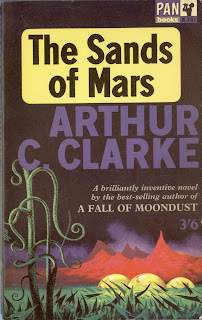The Sands of Mars was Arthur C. Clarke’s second science fiction novel, following Prelude To Space which had also appeared in 1951 (his novella Against the Fall of Night had been published in its original form in 1948).
It was a good time to be a science fiction writer. The genre was beginning to boom. But it was also an awkward time to be writing novels about space exploration. In 1951 there was still very little known about the other planets in the solar system and it still seemed quite possible that Mars and Venus would be at least marginally habitable. It was still even plausible to imagine that life might exist on those planet. Within a few short years the bitter truth, that these planets are impossibly hostile, would become apparent and science fiction novels written in the late 40s and early 50s would come to seem dated. With the solar system consisting entirely of uninhabitable worlds science fiction writers would start to become more interested in writing about interstellar flight.
The Sands of Mars does suffer from this problem. In 1951 Clarke simply had no way of knowing what Mars was actually like. In this novel he assumes there is plant life, of a sort, on Mars and he certainly underestimates the difficulties that colonists would face. He assumes that it will be possible to wander about on the planet’s surface wearing nothing but a face mask and an oxygen tank.
Interestingly the hero of The Sands of Mars is a science fiction writer who finally gets the chance to go into space. It is the year 2000 and a colony has already been established on Mars.
This was another minor problem facing science fiction writers in the early 1950s - they tended to be wildly optimistic about space travel. At that time it seemed (to science fiction writers) to be practically a certainty that we would be colonising the planets by the end of the 20th century.
Naturally Clarke assumes that atomic power will solve most of the problems of space travel.
It’s always amusing to notice what things science fiction authors of the past predicted correctly. In this novel digitised books are an interesting prediction.
Clarke was famous for his lack of interest in characterisation. This was a deliberate choice. Clarke liked Big Ideas science fiction and didn’t want his readers distracted by the emotional dramas of characters. This however is very early Clarke, when he was still finding his feet as a writer, and there is an attempt to give the hero an emotional life.
The hero is Martin Gibson, famed for his novels about space exploration. He’s been invited to Mars as the first passenger on the first regularly scheduled Earth-Mars passenger liner, the Ares. His job is to write newspaper articles which will drum up publicity for the passenger service, and for the Martian colony. Being a reporter he naturally has considerable curiosity and he soon gets the feeling that the colonists are hiding something important from him.
Gibson also, as a result of an accidental encounter, has to deal with the consequences of a painful experience in his youth. He only ever had his heart broken once, but once was enough.
His first impression of Mars is less than favourable. The largest city, Port Lowell, is the size of a small English village. It all seems less epic and heroic than he’d expected.
Gibson gets stranded in the Martian desert, he makes an extraordinary discovery, he slowly unravels the secret the colonists are hiding and he tries to make amends for past failures in his personal life.
This might be over-optimistic but that optimism is what makes the science fiction of the late 40s/early 50s so appealing (and gives them a touch of melancholy when we reflect on how the actual future fell short of the imagined future). It might not be the real Mars as we now know it to be but it is a fascinating look at 1950s ideas on how space colonies would work.
The Sands of Mars also has the distinction of being one of the very first, if not the first, science fiction novels to deal with terraforming. Clarke relies a bit on wishful thinking but he was at least aware that the answer to colonising Mars would have to lie in adapting the Martian environment to our needs, rather than trying to adapt to such a hostile world.
Clarke was also one of the first science fiction writers to appreciate the political ramifications of colonising other worlds, a subject he would explore in more depth in his next novel, Earthlight.
Based on what was known at the time The Sands of Mars is an attempt to deal in a serious logical manner with the various challenges posed by space exploration without doing what so many subsequent writers (even Hard SF writers) have done - resorting to magical solutions such as faster-than-light travel. It’s still an interesting read. Recommended.


No comments:
Post a Comment